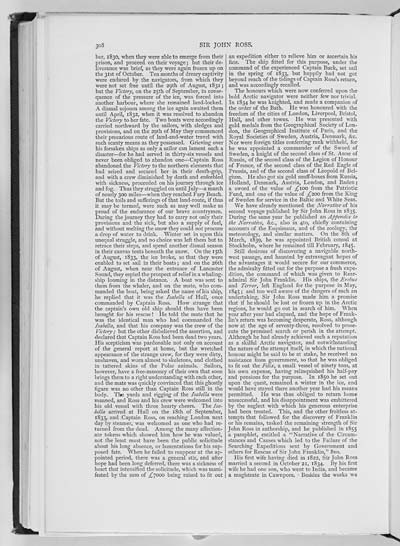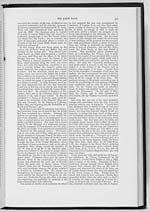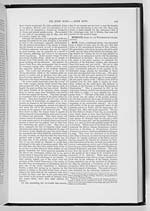308
ber, 1830, when they were able to emerge from their
prison, and proceed on their voyage; but their de-
liverance was brief, as they were again frozen up on
the 31st of October. Ten months of dreary captivity
were endured by the navigators, from which they
were not set free until the 29th of August, 1831;
but the Victory, on the 25th of September, in conse-
quence of the pressure of the ice, was forced into
another harbour, where she remained land-locked.
A dismal sojourn among the ice again awaited them
until April, 1832, when it was resolved to abandon
the Victory to her fate. Two boats were accordingly
carried northward by the sailors, with sledges and
provisions, and on the 29th of May they commenced
their precarious route of land-and-water travel with
such scanty means as they possessed. Grieving over
his forsaken ships as only a sailor can lament such a
disaster�for he had served in thirty-six vessels and
never been obliged to abandon one�Captain Ross
abandoned the Victory to the northern elements that
had seized and secured her in their death-grip,
and with a crew diminished by death and enfeebled
with sickness, proceeded on his journey through ice
and fog. Thus they struggled on until July�a march
of nearly 300 miles�when they reached Fury Beach.
But the toils and sufferings of that land-route, if thus
it may be termed, were such as may well make us
proud of the endurance of our brave countrymen.
During the journey they had to carry not only their
provisions and the sick, but also a supply of fuel,
and without melting the snow they could not procure
a drop of water to drink. Winter set in upon this
unequal struggle, and no choice was left them but to
retrace their steps, and spend another dismal season
in their canvas tents beneath the snow. On the 15th
of August, 1833, the ice broke, so that they were
enabled to set sail in their boats; and on the 26th
of August, when near the entrance of Lancaster
Sound, they espied the prospect of relief in a whaling-
ship looming in the distance. A boat was sent to
them from the whaler, and on the mate, who com-
manded the boat, being asked the name of his ship,
he replied that it was the Isabella of Hull, once
commanded by Captain Ross. How strange that
the captain's own old ship should thus have been
brought for his rescue! He told the mate that he
was the identical man who had commanded the
Isabella, and that his company was the crew of the
Victory; but the other disbelieved the assertion, and
declared that Captain Ross had been dead two years.
His scepticism was pardonable not only on account
of the general report at home, but the wretched
appearance of the strange crew, for they were dirty,
unshaven, and worn almost to skeletons, and clothed
in tattered skins of the Polar animals. Sailors,
however, have a free-masonry of their own that soon
brings them to a right understanding with each other,
and the mate was quickly convinced that this ghostly
figure was no other than Captain Ross still in the
body. The yards and rigging of the Isabella were
manned, and Ross and his crew were welcomed into
his old vessel with three hearty cheers. The Isa-
bella arrived at Hull on the 18th of September,
1833, and Captain Ross, on reaching London next
day by steamer, was welcomed as one who had re-
turned from the dead. Among the many affection-
ate tokens which showed him how he was valued,
not the least must have been the public solicitude
about his long absence, or lamentations for his sup-
posed fate. When he failed to reappear at the ap-
pointed period, there was a general stir, and after
hope had been long deferred, there was a sickness of
heart that intensified the solicitude, which was mani-
fested by the sum of �7000 being raised to fit out
an expedition either to relieve him or ascertain his
fate. The ship fitted for this purpose, under the
command of the experienced Captain Buck, set sail
in the spring of 1833, but happily had not got
beyond reach of the tidings of Captain Ross's return,
and was accordingly recalled.
The honours which were now conferred upon the
bold Arctic navigator were neither few nor trivial.
In 1834 he was knighted, and made a companion of
the order of the Bath. He was honoured with the
freedom of the cities of London, Liverpool, Bristol,
Hull, and other towns. He was presented with
gold medals from the Geographical Society of Lon-
don, the Geographical Institute of Paris, and the
Royal Societies of Sweden, Austria, Denmark, &c.
Nor were foreign titles conferring rank withheld, for
he was appointed a commander of the Sword of
Sweden, a knight of the second class of St. Anne of
Russia, of the second class of the Legion of Honour
of France, of the second class of the Red Eagle of
Prussia, and of the second class of Leopold of Bel-
gium. He also got six gold snuff-boxes from Russia,
Holland, Denmark, Austria, London, and Baden;
a sword of the value of �100 from the Patriotic
Fund, and one of the value of �200 from the King
of Sweden for service in the Baltic and White Seas.
We have already mentioned the Narrative of his
second voyage published by Sir John Ross in 1835.
During the same year he published an Appendix to
the Narrative, &c., also in 4to, chiefly containing
accounts of the Esquimaux, and of the zoology, the
meteorology, and similar matters. On the 8th of
March, 1839, he was appointed British consul at
Stockholm, where he remained till February, 1845.
Still desirous of discovering a navigable north-
west passage, and haunted by extravagant hopes of
the advantages it would secure for our commerce,
the admiralty fitted out for the purpose a fresh expe-
dition, the command of which was given to Rear-
admiral Sir John Franklin. His ships, the Erebus
and Terror, left England for the purpose in May,
1845 ; and too well aware of the dangers of such an
undertaking, Sir John Ross made him a promise
that if he should be lost or frozen up in the Arctic
regions, he would go out in search of him. When
year after year had elapsed, and the hope of Frank-
lin's return was becoming desperate, Ross, although
now at the age of seventy-three, resolved to prose-
cute the promised search or perish in the attempt.
Although he had already achieved such a reputation
as a skilful Arctic navigator, and notwithstanding
the nature of the attempt itself, in which the national
honour might be said to be at stake, he received no
assistance from government, so that he was obliged
to fit out the Felix, a small vessel of ninety tons, at
his own expense, having relinquished his half-pay
and pensions for the purpose. In 1850 he set out
upon the quest, remained a winter in the ice, and
would have stayed there another year had his means
permitted. He was thus obliged to return home
unsuccessful, and his disappointment was embittered
by the neglect with which his generous enterprise
had been treated. This, and the other fruitless at-
tempts that followed for the discovery of Franklin
or his remains, tasked the remaining strength of Sir
John Ross in authorship, and he published in 1855
a pamphlet, entitled a " Narrative of the Circum-
stances and Causes which led to the Failure of the
Searching Expeditions sent by Government and
others for Rescue of Sir John Franklin," 8vo.
His first wife having died in 1822, Sir John Ross
married a second in October 21, 1834. By his first
wife he had one son, who went to India, and became
a magistrate in Cawnpore. Besides the works we

![]() Universal Viewer |
Universal Viewer | ![]() Mirador |
Large image | Transcription
Mirador |
Large image | Transcription
![]()

